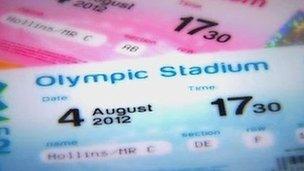London 2012: Foreign sales of Olympic tickets 'flouted'
- Published

Strict rules apply to Olympic ticket sales to avoid them entering the black market
Rules are being flouted by foreign sellers of Olympic tickets, a BBC investigation has revealed.
There was unprecedented demand for the 6.6 million tickets that were sold directly to the British public, starting in March 2011.
But more than one million tickets are on sale through authorised ticket resellers or National Olympic Committees (NOC) around the world.
BBC London has bought or been pledged 14 tickets from resellers abroad.
Strict rules applying to countries outside the European Union dictate tickets can only be sold to those who are resident within that country to stop tickets entering the black market.
Few questions asked
Security expert Reg Walker, who works as director of security specialists at the Iridium Consultancy, said: "The authorised ticket resellers in certain countries outside of the European Union have been remarkably lax in who they sell to and the quantities of tickets they sell and this is how ticket touts are obtaining large volumes of tickets."
After receiving information that some resellers may not be following the rules, BBC London contacted 45 authorised ticket resellers from across the world, posing as ticket buyers based in the UK.
The majority clarified that they needed documentation from the applicant but others asked far fewer questions and seemed willing to sell tickets to applicants from the UK, against the rules.
In the Seychelles, the official ticket reseller, who BBC London spoke to several times, was prepared to sell tickets for the closing ceremony for £700, asking the "buyer" to make a transfer to her committee account so the tickets could later be couriered to the UK.
"Locally, they don't want the tickets now. I will give you the four tickets," said the official seller on one occasion.
"There is no name on the tickets… it's just like [when] you purchase a football ticket," said the woman in another secretly-recorded conversation.
San Marino's authorised ticket reseller admitted tickets had been sold to those in the UK even though Locog (the London Organising Committee of the Olympic and Paralympic Games) has confirmed tickets can strictly only be sold to San Marino residents.
"It is not a problem," said the representative of the official ticket agency, based in Italy, who was recorded secretly.
"I already sold some tickets into England... You must give me your exact address in England for the pro forma invoice."
The official reseller of Albania took payment for two diving tickets and confirmed to the seller that it was "not a problem" that tickets could be sold to those who were not resident in Albania.
'More policing needed'
Although there is no suggestion the ticket sellers themselves are supplying tickets into the black market, experts say the findings raise worrying questions.
Jeremy Summers, an expert in sports law who served as legal counsel for the Sydney Olympics in 2000, said: "I would have thought in these circumstances and bearing in mind the demand, I would have expected more policing and more pressure put on to stop this happening."
In all, BBC London managed to buy or was promised 14 tickets from the official resellers.
A spokesman for Locog said the rules were "very clear" and it would investigate any potential breaches.
In a statement it said: "Each Authorised Ticket Reseller (ATR) has a clear agreement with their National Olympic Committee (NOC) and Locog which states that for those countries outside of the EU, tickets should not be sold outside of their territory."
When asked for a response, the NOC of the Seychelles said it did not sell tickets to non-residents.
The official ticket reseller of Albania said it assumed the ticket applicant was an Albanian expat buying tickets for family and friends in Albania.
There was no response received from San Marino's ticket reseller.
- Published17 March 2012
- Published29 February 2012